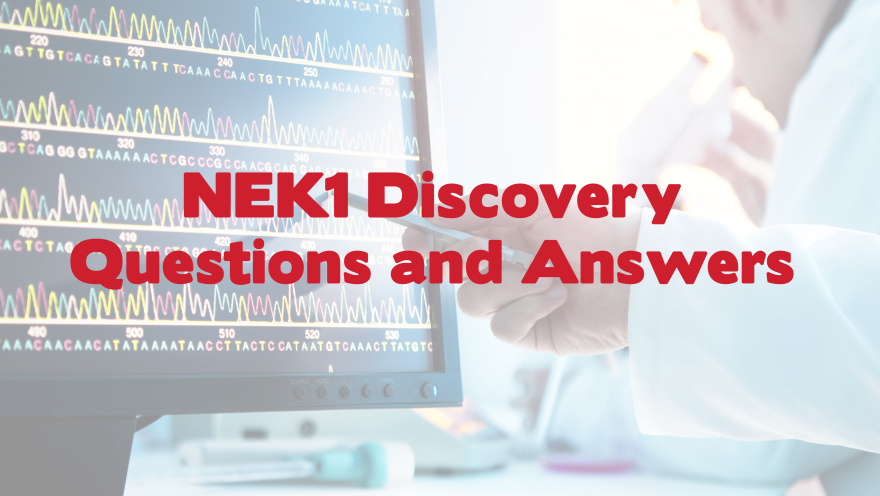Over the last day, The ALS Association has received multiple questions surrounding the NEK1 gene discovery and how it affects people living with ALS. Below are some common questions and our answers, along with places to read more information.
Are NEK1 mutations associated with both familial (inherited) and sporadic (non-inherited) ALS?
Yes – NEK1 mutations are associated with both familial and sporadic ALS. Together, NEK1 is associated with 3% of all ALS cases.
How is the NEK1 gene inherited?
Currently, researchers do not know how the NEK1 gene is inherited, its penetrance (i.e. the proportion of individuals with the NEK1 mutation that show ALS symptoms) or whether the mutation is sufficient alone to cause disease. Researchers are now working diligently to answer these significant questions.
Most familial ALS genes are autosomal dominant for inheritance, meaning that the parent who has a genetic change (mutation) that causes ALS has a 50% chance of passing that mutation to each of his or her children. It is also important to understand that if a person inherits the genetic change, the person is not certain to develop ALS symptoms.
Is genetic testing available for NEK1 gene mutations?
Yes, researchers can test for the NEK1 gene mutation, but it is important to understand that currently it is difficult to interpret a positive or negative NEK1 genetic testing result. We do not know how NEK1 is inherited, its penetrance or whether having the mutation is sufficient alone to cause ALS symptoms.
We recommend that people living with ALS contact their neurologist and genetic counselor for their recommendation.
What is the normal cost of genetic testing?
Cost of genetic testing varies based on the laboratory and the technique used. Contact your neurologist and genetic counselor for more information.
Does insurance cover genetic testing?
Genetic testing for a person living with ALS and family members is not always covered by insurance. Contact your insurance company about cost prior to testing.
How does genetic testing work?
Genetic testing usually involves giving blood or spitting in a special type of tube. Because this testing needs to be ordered by a healthcare professional, the sample is usually taken in the doctor’s office or in a lab associated with the doctor’s office. Results can take anywhere from a few weeks to a few months depending on the type of testing ordered. The genetic counselor or doctor who ordered the test should communicate the results. This is often done in-person at a follow-up appointment or sometimes by telephone.
Are there any clinical trials surrounding the NEK1 mutation?
No. Since it was just discovered, researchers are working to understand if and how it causes ALS symptoms, how it is inherited, and other important questions. Once they learn more information about NEK1, researchers will try to target NEK1 for drug development, which may lead to clinical trials in the future.
Does having a NEK1 mutation exclude people from participating in clinical trials?
This is very unlikely since the NEK1 mutation was just discovered. Researchers need to learn more information (mentioned above) before including NEK1 mutations in clinical trial exclusion criteria.
What research is currently happening to move the understanding of the NEK1 gene forward?
Researchers are trying to understand NEK1’s role in disease. The ALS Associations is currently funding Drs. John Landers of University of Massachusetts Medical School and Catherine Lutz of Jackson Laboratories, to develop novel mouse models to better understand the NEK1’s function for the ALS disease process. They will provide rapid access to these models for the broader ALS research community as soon as they are generated. These tools are important for ALS drug development.
For more information on familial ALS and genetic testing, please visit: http://www.alsa.org/2015-non-responsive-pages/about-als/genetic-testing-for-als.html


Comments
Is the NEK1 gene a mutation itself? Or does everyone have the NEK1 gene and it's just a matter of it being healthy or not?
Hi Richard. While everyone has the NEK1 gene, about 3% of people living with ALS have a mutation of the gene.
Join the conversation. Please comment below.